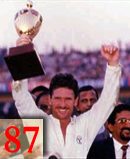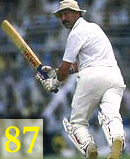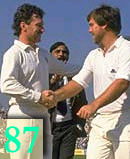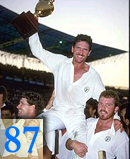

Cricket World Cup Live Audio Video

Broadcast from 2007 March 13 to April 28
Cricket World Cup on TV, Internet and Mobile Phones
The ICC Cricket World Cup All Inclusive Package $199.95World Cup Cricket Live on TV: Live Broadcasting
TV : All Live Matches, Full Replays, Highlights, Interactive TV Application - Get Dish + Full World Cup Cricket PackageWorld Cup Cricket on Internet: Live Streaming
Internet: Full coverage (limited to one Internet Address), Interactive Highlights, Live audio - Get Dish + Full World Cup Cricket PackageWorld Cup Cricket on Mobile: Live Audio
Mobile: Ball-by-Ball coverage on your mobile phone, Discounted access to unlimited SMS updates - Get Dish + Full World Cup Cricket PackagePrudential World Cup Cricket 1987, India & Pakistan
Dates: 9 October 1987 to 8 November 1987
Teams: West Indies, England,India, Pakistan, Australia,
New Zealand, Sri Lanka, Zimbabwe
The fourth World Cup saw a move away from England, with
India and Pakistan co-hosting the event, which saw the
same cast of teams as in 1983, Zimbabwe having emerged
victorious from the ICC trophy once again. As before,
the preliminary matches featured two groups of four teams,
who played each
other twice.
ICC Cricket World Cup
World championship of men's One Day International cricket
World Cup Cricket history, champions | World Cup Cricket facts, trivia | World Cup Cricket records before 2007 | 2007 World Cup Cricket records | World Cup Cricket 1975 | World Cup Cricket 1979 | World Cup Cricket 1983 | World Cup Cricket 1987 | World Cup Cricket 1992 | World Cup Cricket 1996 | World Cup Cricket 1999 | World Cup Cricket 2003 | World Cup Cricket 2007 | World Cup Cricket 2011 | World Cup Cricket 2015 | World Cup Cricket 2019World Cup Cricket 1987
The ICC Cricket World Cup is the world championship of one-day cricket, a tournament held quadrenially between all Test-playing nations (currently 10 nations), plus qualifiers. The next tournament will be held in the West Indies in 2007 and will consist of 16 teams.


Australia Won the World Cup
The fourth World Cup was more widely watched, more closely fought, and more colourful than any of its three predecessors held in England. Any doubts about it were dispelled by the opening matches when Pakistan, the favourites, were run close by Sri Lanka; when India, the holders, were beaten by Australia by 1 run; when England succeeded in scoring 35 off their last three overs to beat West Indies; and when the gallant amateurs of Zimbabwe lost by only 3 runs to New Zealand.If the rest of the Reliance Cup, as it was officially known and seldom called, could not quite live up to such a start, the experiment of an oriental World Cup was still acknowledged to have been a great success. The semi-finals in Lahore and Bombay held the sub-continent by the ears and eyes, even if they did not produce the results desired by the tens of millions who were following the matches on radio and television. The arrangements for the final, at Eden Gardens in Calcutta, were praised to the full by the winning Australian captain, and rightly.
Any drawbacks resulted from the geographical enormity of the two host countries and the determination of the Indo-Pakistan Joint Management Committee to spread the games around as many as 21 venues. It was the equivalent of staging a tournament in Europe, barring only the Soviet Union, without quite the same facility of transport and telecommunications. Fewer centres would have meant less travelling, a shorter and more compact competition – it took six weeks against less than a month for the 1983 World Cup – and increased enjoyment all round. For successive matches, the Sri Lankans were shunted from Peshawar, in the North-West Frontier Province of Pakistan, to Kanpur in central India, back to Faisalabad, then across the border again to Pune: two-day journeys every time, with hours spent in transit lounges at airports waiting for flights.
Nevertheless, in circumstances which were perhaps more arduous than they need have been, the organisers did excellently. In return, the weather was kind to them. To all intents, only one match was affected by rain, when Australia and New Zealand were reduced to 30 overs each in Indore. (Happily, the rule that a match could not be carried over to its second day was never exposed in its absurdity.) Otherwise the matches were of 50 overs per side, and on good pitches totals similar to those in previous 60-over World Cups were raised. Viv Richards, and West Indies as a team, set up new records against Sri Lanka for World Cup innings.
If the umpiring was not of the very highest standard, its neutrality served to minimise grievances. Poor neutral umpiring, however, can never be a substitute for good umpiring, whether by home or neutral officials. The standard of scoring, it has to be recorded, was inadequate in many centres, done as it was by local scorers unfamiliar with visiting players, while the telegraph boards were not always kept up to date.
One especial virtue in staging the World Cup in India and Pakistan was that spin had a full part to play, whereas previous competitions in England had been dominated by repetitive seamers. Not one over of spin was risked in the 1975 final. Australia were untypical in that they usually allotted only ten overs to spin; the majority of teams fielded two spinners and benefited on the slow batting pitches that prevailed. In the qualifying rounds, seven of the nine most economical bowlers were spinners. That said, the leading wicket-takers were both fast bowlers, Craig McDermott equalling the World Cup record of eighteen and Imran Khan capturing seventeen in one match less.
Batsmen were not troubled by dew when batting first, as some had feared, but by the strain of batting second. Out of 27 matches, nineteen were won by the side batting first. The received wisdom had been to bowl first in one-day internationals and to determine the target. Now every side wanted to bat first, then watch the opposition – fatigued by three and a half hours’ fielding in the heat – make mistakes and panic as the run-rate climbed to 7 and 8 an over. The side batting first played the ball according to its merits; the side batting second seemed to play it according to the run-rate required.
In this context, Australia were fortunate to bat first in five of their six qualifying games, and to be able to do so again in their semi-final and final, on pitches which lost what bounce they had. This luck aside, they were still the team most deserving of victory: they appeared to put the most into the tournament – the sweat was dripping from the peaks of the batsmen’s caps when they warmed up in Madras – and they gained their first success of note since 1984. England, the runners-up, arrived with a specialist in tropical diseases and a microwave oven but with only three batsmen capable of scoring at a run a ball. They won whenever their bowlers were able to make up for the deficiencies in their batting.
Co-hosts India and Pakistan, as holders and favourites, had been expected to meet in the final but never met at all, not even in a hastily conceived third-place play-off match which fell through owing to the exorbitant demands of some players. Indeed, it was perhaps as well that their paths never crossed, for there were reports of communal conflict in India after the semi-final results. Pakistan blew hot too soon, winning their first five qualifying games, largely on the basis of some overwhelming bowling from Imran Khan and Abdul Qadir, only for their luck to turn in the semi-final.
In a sense, India handicapped themselves by playing in the weaker qualifying group, much as England had in 1979. In both cases the hosts qualified without having the weak links in their bowling exposed. India’s batting was collectively the most brilliant in the tournament but not always the most effective. The demands of their crowds for spectacular hitting, and enticing awards from a sponsor for every four and six they hit, cannot have been beneficial influences; likewise a never settled dispute which the senior Indian players had with their Board over insignia.
West Indies, in transition, missed their fast bowlers of experience. It is not inconceivable that Malcolm Marshall could have won the World Cup for them had he played. New Zealand, too, were in transition in the absence of Richard Hadlee. Sri Lanka, in the field, were utterly defensive, and confronted by mountainous totals their talented batsmen were crushed.
Like the Sri Lankans, the Zimbabweans returned home without a victory, but they gained many friends by their fielding – giving themselves as professionals never quite could – and many sympathisers by their naïve mistakes and run-outs. For sheer heroism, the innings of the World Cup was David Houghton’s 142 against New Zealand.
The Australians had the same keen, uncynical spirit as the Zimbabweans. They worked and worked as a team; and every follower of the game had to be pleased in some measure when, at the end of the Australians’ victory lap around Eden Gardens, Allan Border was raised on the shoulders of his team-mates and the gold Reliance Cup placed in his hands.
Cricket World Cup 1987 Finals Score Board

Australia beat England by 7 runs
The first World Cup final to be played outside of England was also the closest.Australia won the toss, elected to bat and made a fast start that ultimately proved the difference at the end of the match.
Phil DeFreitas and Gladstone Small were wayward with the ball while David Boon took full advantage with the bat, top scoring with 75.
And late in the innings, Allan Border and Mike Veletta kept the scoreboard ticking over to set an imposing 254 for victory.
Tim Robinson fell in the first over of England's reply, but soon they looked to be taking control of the match, Graham Gooch, Bill Athey, Mike Gatting and Allan Lamb all making solid contributions.
But the match turned when the captains came head-to-head, Border bringing himself on to bowl and Gatting reverse-sweeping the first ball straight to Greg Dyer behind the stumps.
From that point on, England slipped further and further behind the run-rate despite the best efforts of the tail, and nine runs off the final over left them seven short of victory.
|
253 for 5 (50.0 overs) |
|
246 for 8 (50.0 overs) |
| Batsman |
|
Runs |
Balls |
4s |
6s |
|
| DC Boon | c Downton | b Hemmings | 75 |
125 | 7 | 0 |
| GR Marsh | b Foster | 24 |
49 | 3 | 0 | |
| DM Jones | c Athey | b Hemmings |
33 |
57 | 1 | 1 |
| CJ McDermott | b Gooch | 14 |
8 | 2 | 0 | |
| AR Border | run out | (Robinson/Downton) | 31 |
31 | 3 | 0 |
| MRJ Veletta | not out | 45 | 31 | 6 | 0 | |
| SR Waugh | not out | |
5 |
4 | 0 | 0 |
| Extras | |
7nb 5w 1 b 13lb | 26 | |
||
| Total | |
for 5 | 253 | |
||
|
|
Live Cricket
| Batsman |
|
Runs |
Balls |
4s |
6s |
|
| GA Gooch | lbw | b O'Donnell | 35 |
57 | 4 | 0 |
| RT Robinson | lbw | b McDermott |
0 |
1 | 0 | 0 |
| CWJ Athey | run out | (Waugh/Reid) |
58 |
103 | 2 | 0 |
| MW Gatting | c Dyer | b Border | 41 |
45 | 3 | 1 |
| AJ Lamb | b Waugh |
45 |
55 | 4 | 0 | |
| PR Downton | c O'Donnell | b Border |
9 |
8 | 1 | 0 |
| JE Emburey | run out | (Boon/McDermott) | 10 |
16 | 0 | 0 |
| PAJ DeFreitas | c Reid | b Waugh | 17 |
10 | 2 | 1 |
| NA Foster | not out | |
7 |
6 | 0 | 0 |
| GC Small | not out |
3 |
3 | 0 | 0 | |
| Extras | |
4nb 2w 1b 14lb | 21 | |
||
| Total | |
for 8 | 246 | |
||
|
|
Live Cricket
Australia Team: DC Boon, GR Marsh, DM Jones, CJ McDermott, AR Border, MRJ Veletta, SR Waugh, SP O'Donnell, GC Dyer, TBA May, BA Reid
Englan Team: GA Gooch, RT Robinson, CWJ Athey, MW Gatting, AJ Lamb, PR Downton, JE Emburey, PAJ DeFreitas, NA Foster, GC Small, EE Hemmings.
Summary of results
Group B: Pakistan v Sri Lanka at Hyderabad - October
8, 1987
Pakistan won by 15 runs. Pakistan 267-6 (50 ov); Sri Lanka
252 (49.2 ov).
Group A: India v Australia at Chennai - October 9, 1987
Australia won by 1 run. Australia 270-6 (50 ov); India
269 (49.5 ov).
Group B: England v West Indies at Gujranwala - October
9, 1987
England won by 2 wickets. West Indies 243-7 (50 ov); England
246-8 (49.3 ov).
Group A: New Zealand v Zimbabwe at Hyderabad - October
10, 1987
New Zealand won by 3 runs. New Zealand 242-7 (50 ov);
Zimbabwe 239 (49.4 ov).
Group B: Pakistan v England at Rawalpindi - October 12,
1987
Pakistan won by 18 runs. Pakistan 239-7 (50 ov); England
221 (48.4 ov).
Group A: Australia v Zimbabwe at Chennai - October 13,
1987
Australia won by 96 runs. Australia 235-9 (50 ov); Zimbabwe
139 (42.4 ov).
Group B: Sri Lanka v West Indies at Karachi - October
13, 1987
West Indies won by 191 runs. West Indies 360-4 (50 ov);
Sri Lanka 169-4 (50 ov).
Group A: India vs New Zealand at Bangalore - October 14,
1987
India won by 16 runs. India 252-7 (50 ov); New Zealand
236-8 (50 ov).
Group B: Pakistan v West Indies at Lahore - October 16,
1987
Pakistan won by 1 wicket. West Indies 216 (49.3 ov); Pakistan
217-9 (50 ov).
Group A: India v Zimbabwe at Mumbai - October 17, 1987
India won by 8 wickets. Zimbabwe 135 (44.2 ov); India
136-2 (27.5 ov).
Group B: England v Sri Lanka at Peshawar - October 17,
1987
England won on faster scoring rate. England 296-4 (50
ov); Sri Lanka 158-8 (45 ov).
Group A: Australia v New Zealand at Indore - October
18, 1987
Australia won by 3 runs. Australia 199-4 (30 ov); New
Zealand 196-9 (30 ov).
Group B: Pakistan v England at Karachi - October 20,
1987
Pakistan won by 7 wickets. England 244-9 (50 ov); Pakistan
247-3 (49 ov).
Group B: Sri Lanka v West Indies at Kanpur - October
21, 1987
West Indies won by 25 runs. West Indies 236-8 (50 ov);
Sri Lanka 211-8 (50 ov).
Group A: India v Australia at Delhi - October 22, 1987
India won by 56 runs. India 289-6 (50 ov); Australia 233
(49 ov).
Group A: New Zealand v Zimbabwe at Calcutta (Kolkata)
- October 23, 1987
New Zealand won by 4 wickets. Zimbabwe 227-5 (50 ov);
New Zealand 228-6 (47.4 ov).
Group B: Pakistan v Sri Lanka at Faisalabad - October
25, 1987
Pakistan won by 113 runs. Pakistan 297-7 (50 ov); Sri
Lanka 184-8 (50 ov).
Group A: India v Zimbabwe at Ahmedabad - October 26,
1987
India won by 7 wickets. Zimbabwe 191-7 (50 ov); India
194-3 (42 ov).
Group B: England v West Indies at Jaipur - October 26,
1987
England won by 34 runs. England 269-5 (50 ov); West Indies
235 (48.1 ov).
Group A: Australia v New Zealand at Chandigarh - October
27, 1987
Australia won by 17 runs. Australia 251-8 (50 ov); New
Zealand 234 (48.4 ov).
Group A: Australia v Zimbabwe at Cuttack - October 30,
1987
Australia won by 70 runs. Australia 266-5 (50 ov); Zimbabwe
196-6 (50 ov).
Group B: England v Sri Lanka at Poona - October 30, 1987
England won by 8 wickets. Sri Lanka 218-7 (50 ov); England
219-2 (41.2 ov).
Group B: Pakistan v West Indies at Karachi - October
30, 1987
West Indies won by 28 runs. West Indies 258-7 (50 ov);
Pakistan 230-9 (50 ov).
Group A: India vs New Zealand at Nagpur - October 31,
1987
India won by 9 wickets. New Zealand 221-9 (50 ov); India
224-1 (32.1 ov).
Semi-Final: Pakistan v Australia at Lahore - November
4, 1987
Australia won by 18 runs. Australia 267-8 (50 ov); Pakistan
249 (49 ov).
Semi-Final: India v England at Mumbai - November 5, 1987
England won by 35 runs. England 254-6 (50 ov); India 219
(45.3 ov).
Final: Australia v England at Calcutta (Kolkata) - November
8, 1987
Australia won by 7 runs. Australia 253-5 (50 ov); England
246-8 (50 ov).



